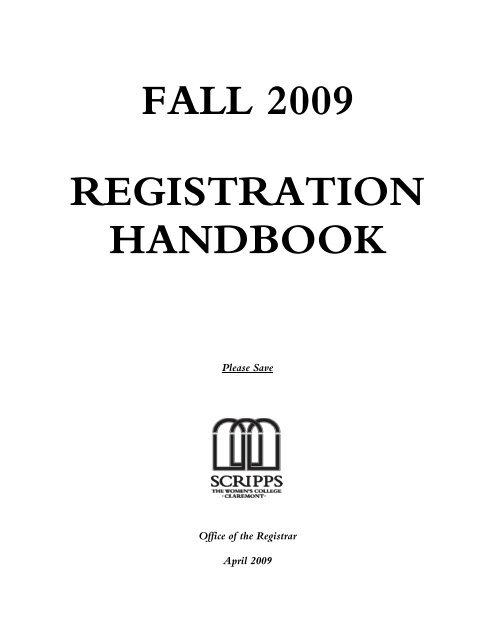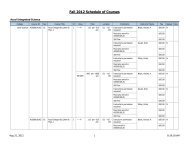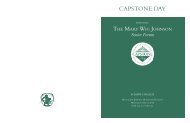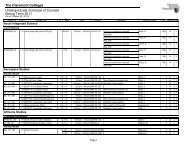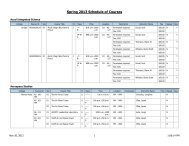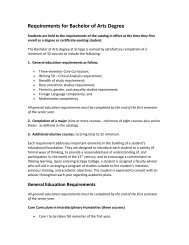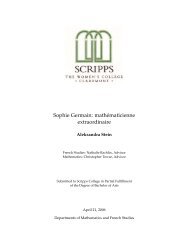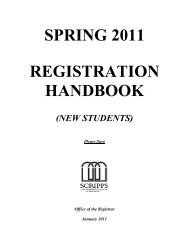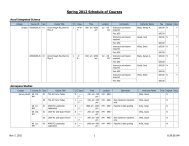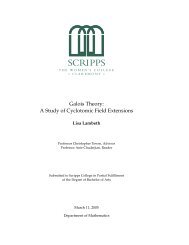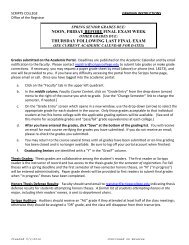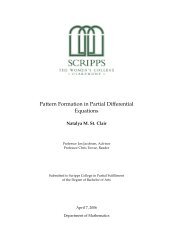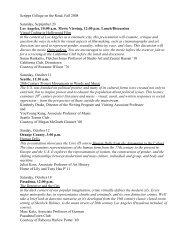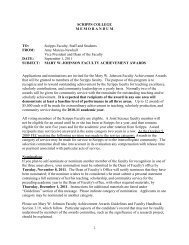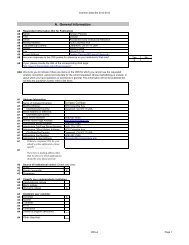final examinations - Scripps College
final examinations - Scripps College
final examinations - Scripps College
Create successful ePaper yourself
Turn your PDF publications into a flip-book with our unique Google optimized e-Paper software.
FALL 2009REGISTRATIONHANDBOOKPlease SaveOffice of the RegistrarApril 2009
TABLE OF CONTENTS<strong>Scripps</strong> <strong>College</strong> Calendar – Fall 2009 1Changes in Registration 1Registration Information 2Class Level 2Required to Register 2Permission to Register 3Cross-Registration Restrictions 3Joint and Cooperative Programs 3Courses to Meet General Requirements for Graduation 4Major/Minor Declaration 5Committee on Academic Review 5Final Examinations 6Senior Thesis Guidelines 7Thesis Title Page – Required Layout 9Senior Seminar and Thesis Enrollment/Deadlines Guide, 2009-2010 10Core III Section Descriptions 13New and Revised Course Descriptions Not in Current Catalog 16Courses Approved to Meet the Race and Ethnic Studies Requirement 20Pre-enrollment Permission Slip (make copies as needed) 23
SCRIPPS COLLEGE CALENDARFall 2009Day Date Deadline/EventThurs.-Mon. August 27-31 Orientation and RegistrationTuesday September 2 Classes begin 8:10 a.m.Monday September 14 Add deadline; no class may be addedafter this dateWednesday October 7 Faculty report low grades (not required)Mon.-Tues. October 19-20 Fall BreakThursday October 22 Drop deadline without academic penaltyThurs.-Fri. November 26-27 Thanksgiving recessTues.-Mon. December 1-7 Preregistration for Spring 2010 semesterWednesday December 9 Last day of classesIntent to Withdraw from classes deadlineThursday-Friday December 10-11 *Reading DaysMonday and Friday December 7 & 11 Fall Thesis deadlines (see pages 10-12)Monday-Friday December 14-18 Final <strong>examinations</strong>Thursday December 24 Grades due by noonTuesday January 19 Spring 2010 classes beginNote: The Wednesday prior to <strong>final</strong>s week is designated the last day of classes. Thursday and Friday of the lastweek of classes each semester are designated as Reading Days. Classes are suspended, but professors may holdstudy sessions, critique sessions, or reviews. No new material may be introduced at these sessions and no examsgiven except to second-semester seniors.CHANGES IN REGISTRATIONSeptember 1-14September 15 – October 22October 23 – December 9Beginning December 10Adds, Drops, Audits and Change Grading OptionDrops, Change Grading Option to Pass/Fail orAudit (No Adds)Intent to Withdraw (W)(No Adds, Drops or Changes)No Changes1
REGISTRATION INFORMATIONCLASS LEVELRegistration days and times have been assigned by projected class level randomly within fouralphabetical groups. The four groups will rotate each semester within projected class level.The first group has names beginning with A-E; the second group F-K; third, L-R; and S-Z last.For preregistration in April, the first group to register will be those whose names beginF-K. Remember that these groups rotate within projected class level so that projected seniorsregister at the beginning of preregistration and projected first year students register at the end,with juniors and sophomores between. This methodology is similarly followed at all of the<strong>College</strong>s, representing a collaborative effort.Class Level Courses CompletedFirst Year 0 - 7.9Sophomore 8.0 - 15.9Junior 16.0 - 23.9Senior24.0 - UpREQUIRED TO REGISTER1. Registration forma. Course ID's from Schedule of Coursesb. Adviser's approval signature2. Permission slips as needed (see page 3)3. No outstanding financial obligationsCurrent space availability (number of seats and restrictions) can be viewed on theacademic portal, “Claremont <strong>College</strong>s Course Schedule.”Notes‣ See Cross-Registration Restrictions regarding limits to non-<strong>Scripps</strong> enrollments.‣ Audited courses must be added during first ten instructional days on space-availablebasis with instructor written permission. Does not earn ANY credit.‣ Pass/fail option limited to one elective course per semester; no more than fourcourses total. Requires C grade (not including C-) for passing (P) grade. May NOTbe used to meet ANY requirement, e.g., breadth, language, major, minor.2
PERMISSION TO REGISTER1. Language placement exams will be heldduring orientation for new students inaccordance with the orientation schedule.2. Music Department (<strong>Scripps</strong> and Pomona)issues permission slips and requiresauditions:New and returning students must sign upfor auditions/interviews at the <strong>Scripps</strong>Performing Arts Center. For privatelessons at Pomona <strong>College</strong>, contactPomona Music Department, ext. 18155.(Pomona private lessons have fees notincluded on your <strong>Scripps</strong> bill.).3. Special <strong>Scripps</strong> forms available inRegistrar's Office for:a. Independent Studyb. Independent Academic Internshipc. Senior Thesis (see pages 7-12)4. Various faculty members issue writtenpermission to enroll in other coursesrequiring it. (Refer to the “Comments”column of the Five-<strong>College</strong> CourseSchedule or “Requirements” on theAcademic Portal schedule.)Tear out the “Pre-EnrollmentPermission Slip” (last page ofhandbook), and make copies as youneed them. The form must be signedby the course instructor andsubmitted to the Registrar’s Officeduring preregistration.CROSS-REGISTRATION RESTRICTIONSFaculty adviser permission on registration forms is required to exceed these limits.1. First-Year Students: In first semester,no off-campus courses except in Joint orCooperative Programs; in secondsemester, one off-campus course.2. Sophomores: One off-campus course.3. Juniors and Seniors: Two off-campuscourses.JOINT AND COOPERATIVE PROGRAMS(in which <strong>Scripps</strong> participates)• American Studies• Anthropology (Pitzer)• Art History (Pitzer, Pomona)• Asian Studies• Asian American Studies• Black Studies• Chicano Studies• Classics (CMC, Pitzer, Pomona)• German (all levels)• Joint Science (CMC, Pitzer)• Media Studies3• Philosophy (CGU, CMC, HMC)• Physical Education (JP-Ducey Gym)• Religious Studies• Science, Technology & Society• Theatre• The Claremont <strong>College</strong>s ModernLanguages Program (courses numbered1-51b, except 11)• Intercollegiate Women’s Studies
COURSES TO MEET GENERAL REQUIREMENTSFOR GRADUATION• The Bachelor of Arts degree is earned by satisfactory completion of a minimum of 32 courses.• All courses applying toward specific requirements must be full courses passed with a letter grade.• All general education requirements must be completed by the end of the first semester of the senior year.Writing 50 and CORE I (First-Years)CORE III (see Section Course Descriptions, pages 13-15)Breadth of Study (1 course in each area)1. Fine Arts (1 course from the following):• Any Studio Art course• Dance (full course only which includes DanceHistory and Theory)• Music 003, 081 or any Music Theory or MusicHistory course• Theatre 001A-D, 002, 004, 006, 14, 020A, 020B,110-115• An equivalent course2. Letters (1 course from the following):• Any literature course taught in English or as anupper-division modern language course, but notwriting• Any Art History course (for students enteringFall 2006 or later)• Classics (except Greek, Hebrew or Latinlanguage courses through 102)• HMSC135*, 145• Any Philosophy course except logicand PHIL 095 JT• Any Religious Studies course• An equivalent course3. Natural Sciences (1 course from the following):• Any Joint Science course numbered 50-81 fornon-science majors• ENGR 079L at HMC for non-science majors• Any introductory science course for majors inBiology, Chemistry or Physics• NEUR 095 JT• An equivalent course with a lab4. Social Science (1 course from the following):• Anthropology below 100• Economics 040, 051 or 052• History (any course)• HMSC 135*• Politics 100, 105, 110, 118, 120, 130, or 140, 144• Psychology 052• An equivalent course*HMSC 135 may not double count for both Lettersand Social Science, only one or the other.Race and Ethnic Studies Requirement (1 course)(See pages 20-22 for comprehensive list of approved courses tomeet this requirement.)Fall 2009 Courses:AMST125 SC, ANTH127 AA, ARHI 137 PZ,ARHI178 BK, BLCK010 BK,ENGL130 BK, ENGL132 BK, ENGL184B CH,HIST111A BK, HIST114 BK, HIST125 CM,PSYC157 SC, PSYC188 BK, RLST142 BK,SOC 150 CH, SPNT126B CHForeign Language (one of the following sequences orplacement)Students are strongly encouraged to fulfill their languagerequirement in an uninterrupted sequence and mustcomplete the requirement by the end of the first semester ofthe senior year.ASL: Only as transfer credit (Please contact theRegistrar’s Office for additional information.)Arabic 001, 002, 033Chinese 001a, 001b, 051aClassics (Latin) 008a, 008b, & 100 or 110 or 112Classics (Greek) 051a, 051b, & 101aClassics (Hebrew) 052a, 052b & 102French 001, 002, & 033German 001, 002, & 033Italian 001, 002, & 033Japanese 001a, 001b, 051aKorean 001, 002, 033Russian 001a, 001b, & 033Spanish 001, 002, & 033An equivalent sequence of courses to reach requiredcompetencyMathematicsMath 023 orPlacement exam into Math 030 or higher orOne Philosophy course in symbolic logic orOne course in applied math (i.e., Statistics –BIOL175, ECON120, PSYC103)Gender and Women's Studies (1 course)Any full-course listed in the <strong>Scripps</strong> catalog, or semiannualbrochure as an approved Women's Studiescourse.4
MAJOR/MINOR DECLARATIONResources to Investigate Majors• Adviser and other faculty• Career Planning and Resources• Introductory courses• Personal interests and abilitiesForms and Deadlines(forms are available in the Registrar’s Office)Sophomores must declare their major by submitting an approved Junior MajorForm to the Registrar's Office before April preregistration for their junior year.Seniors must submit an approved Senior Major Form during preregistration for their<strong>final</strong> semester of enrollment.Juniors and Seniors need to submit a Junior or Senior Minor Form (available inthe Registrar's Office) if applicable.Seniors must submit a Course Substitution Form (available in the Registrar'sOffice) for any changes made to your Senior Major Form.COMMITTEE ON ACADEMIC REVIEWStudents must petition for the following:• Enroll in Independent Study or Independent Academic Internship• Exception to any stated deadline (e.g., add, drops, thesis, etc.)• Exception to or alteration of any stated academic requirement or policy• Extension of deadline for an Incomplete grade (refer to the on-line 2007-2008Catalog, “Academic Policies and Procedures” section for an explanation ofthe Incomplete Grade Policy)• Enrollment in six or more courses (including outstanding Incompletes)• Postpone enrollment in Writing 50, Core I, and Core II or Core III.• A self-designed major or minor• Accelerated or Combined Degree programs• Change a scheduled exam• Receive transfer credit for <strong>College</strong>-Level Examination Program (CLEP)Subject ExaminationPetition forms are available in the Registrar's Office. You may also obtain a Petitionform on the WEB (click Academics, Registrar, Students, Forms Available to Print,“Committee on Academic Review Petition”). Additional Committee responsibilities arediscussed in the current Catalog and The Guide to Student Life.5
FINAL EXAMINATIONSFinal <strong>examinations</strong> for the fall 2009 semester are Monday-Friday, December 14-18. Refer to theUndergraduate Schedule of Courses (pg. v) for the <strong>final</strong> examination schedule for the fall semester. The <strong>final</strong>examination schedule is standardized for the five undergraduate colleges, and can be accessed on theRegistrar home page under the faculty links. The following information is published in the schedule eachsemester:1. Examination times for “arranged” classes, as well as for classes which meet at times different fromthe Standard Class Times must be scheduled by mutual agreement of the instructor and the students;classroom space must also be specially arranged.2. Final <strong>examinations</strong> will be in the same rooms assigned for regular class work unless otherarrangements are made with the Registrar’s Office. In the event that another room is used, theinstructor will announce the change.3. To be counted as work completed in the course, all papers, reports, drawings and other assignedmaterial must be submitted to instructors before the scheduled date of the <strong>final</strong> examination, unlessan earlier deadline is given.4. In the spring semester, seniors completing requirements for graduation must take <strong>final</strong> <strong>examinations</strong>during the last week of regularly scheduled classes.In addition, the following applies to <strong>Scripps</strong>:1. Final exams for seminars are as follows:Final exams for Monday afternoon seminars will be held on the <strong>final</strong> exam schedule withMW 2:45 courses.Final exams for Wednesday afternoon seminars will be held on the <strong>final</strong> exam schedule withMW 4:15 courses.Final exams for Friday afternoon seminars would need to be scheduled at a time when allstudents had no other exam conflicts and the room would need to be reserved through theRegistrar’s Office.2. No changes in scheduled <strong>examinations</strong> may be made except by petition to the Committeeon Academic Review.3. In order to protect students from the excessive academic pressure of being examined during thelast week of classes, it is urged that all faculty give their <strong>examinations</strong> within the published <strong>final</strong>examination period. If, for emergency reasons, the <strong>final</strong> examination has to be given earlier, theexamination must be confined to the hours during which the class is scheduled to meet.4. Because grades in the spring semester for graduating seniors must be reported to the Registrar onthe <strong>final</strong> day of classes, seniors completing requirements for graduation may not take <strong>final</strong><strong>examinations</strong> during the regular examination period.6
SENIOR THESIS GUIDELINESDeadlines1. See "Senior Seminar and ThesisEnrollment/Deadlines Guide” (pages 10-12)2. "Permission to Enroll for Senior Thesis" toRegistrar by last day to add classes3. Thesis deadline extension by petition onlyReaders1. At least one <strong>Scripps</strong> faculty member who willbe instructor of record and responsible forcoordinating and submitting the grade2. At least one faculty member withindepartment of the major3. For dual majors, one faculty member fromdepartment of each major; at least one <strong>Scripps</strong>faculty memberRegistrationAll seniors are required to have permission fromboth readers to enroll for thesis.A “Permission to Register for Senior Thesis” form is available in the Registrar’s Office.You may also print this form from the WEB (click Academics, Registrar – For Students,Available Forms to Print, “Senior Thesis Registration Permission or Change”).Refer to the “Senior Seminar and Thesis Enrollment/Deadlines Guide” (pages 10-12)to determine in which semester you should register for your thesis. The guide alsoindicates which majors have a required Senior Seminar.Additional Deadline Information• Seniors should receive clarification of enrollment and deadline requirements from their majoradvisers.• The "Senior Seminar and Thesis Enrollment/Deadlines Guide" is only designed as a guide andis subject to change and faculty/student arrangements; however, the Registrar's Office must benotified of deviations from the Guide.• In addition, each department decides on deadlines for completion of intermediate stages, suchas bibliography, outline, and first draft.• Seniors who are not on campus in the fall semester preceding graduation but who register forspring have a Friday, April 23, deadline (science major deadline is April 26). The deadlinefor honors theses is Friday, April 23.7
• A student must petition to the Committee on Academic Review to extend herdeadline beyond that established for her major. Petitions to extend the thesis deadlinemust include a recommendation from the first reader. Her petition must be received in theRegistrar's Office before her thesis deadline. A thesis not turned in or petitioned by thedeadline will be assigned an F grade.• A petition to extend a fall thesis deadline which is denied could result in a grade of F or awithdrawal based upon the thesis readers' recommendation to the Committee on AcademicReview.• A petition to extend a spring thesis deadline which is denied could result in a withdrawal,or an F. The thesis readers determine the grade to be assigned if a spring petition for anextension is denied. A petition to extend a spring thesis deadline may delaygraduation.Procedures and FormatGradesTwo printed, bound copies of the thesis (three copies if you have three readers) are duein the Registrar's Office by 5:00 p.m. of the deadline indicated in the "SeniorSeminar and Thesis Enrollment/Deadlines Guide". (Science majors deliver theirtheses to the Joint Science Department.)The length of the thesis is determined by the scope of the subject. It should be longenough to cover the material appropriately and concisely. Individual thesis requirementsshould be determined by the student in collaboration with her readers. Assistance usingword processing for the thesis is available in the Academic Computing Lab. Your readersshould provide information regarding which style manual is preferred for your major.Common style manuals include the MLA Style Sheet, and A Manual for Writers of TermPapers, Theses and Dissertations by Kate Terabian.A GRADE OF D OR HIGHER IS REQUIRED ON THE THESIS.While the <strong>Scripps</strong>' reader is responsible for filing the thesis grade, evaluation of the thesisto determine the grade is a joint effort of both readers. If they disagree about the quality, athird reader will be appointed by the Dean of Faculty.Upon the recommendation of the readers, a copy of a thesis judged to be superior may befiled in Denison Library.I M P O R T A N T !!PLEASE REFER TO PAGE 9FOR REQUIRED LAYOUT FOR THESIS TITLE PAGE7
THESIS TITLE PAGE – REQUIRED LAYOUTTITLE CLEARLY STATEDWOMEN'S ROLES IN THE DEVELOPMENT OFOPERA: PERFORMANCE AND COMPOSITIONSTUDENT'S NAME INCLUDEDbyJESSICA M. COOLIDGESUBMITTED TO SCRIPPS COLLEGE IN PARTIAL FULFILLMENTOF THE DEGREE OF BACHELOR OF ARTSBOTH THESIS READERS INDICATEDPROFESSOR HUANGPROFESSOR KANGDATE OF SUBMISSIONApril 23, 20109
SENIOR SEMINAR AND THESIS ENROLLMENT/DEADLINES GUIDE, 2009-2010Major Senior Thesis ThesisSeminar Enrollment DeadlineAll Off-Campus Majors Honors by petition only Spring April 23(see Catalog for criteria)American Studies Fall: AMST 190 Spring: AMST 191April 16HonorsFall: AMST 190 Spring: AMST 191 April 16Anthropology Fall: ANTH 190 Spring: ANTH191 April 23Honors Fall: ANTH 190 Spring: ANTH191April 23Art FallFall Project and Paper (Art 192) December 11Honors Spring Advanced Senior ProjectApril 23(Art 193)Art Conservation No Spring April 30Art History Fall: ARHI191H (seminar) Spring: ARHI191B (thesis) April 30.5 course .5 courseHonors (See Catalog for requirements) April 30Asian Studies No Fall December 11Asian American Studies Fall Spring April 23Biology BIOL 188LBIOL 190L or 191 December 7Fall or Spring Fall or Spring April 26Honors BIOL 188L Required BIOL 190LFall or Spring Fall or Spring April 26Black Studies No Fall or December 11Spring April 23Chemistry CHEM 188LCHEM 190L or 191 December 7Fall or SpringFall or Spring April 26HonorsCHEM 188L Required CHEM 190LFall or Spring Fall or Spring April 26Chicano Studies Fall/Spring Fall or December 11Spring April 30Classics Fall Fall or December 11Spring April 23Honors Fall Fall and Spring April 23Dance Fall Spring April 30Economics/Mathematical FallSpring April 23EconomicsHonorsFall Spring April 23Economics-Accounting Fall: ECON 190 (optional) Spring April 23(off-campus major)English Fall SpringApril 23HonorsFall Spring April 23Environment, Economics, Fall: ECON190 (optional) Spring April 23and PoliticsHonors Spring April 23Environmental Science BIOL 188LBIOL 190L or 191 December 7Fall or SpringFall or Spring April 26HonorsBIOL 188L Required BIOL 190LFall or Spring Fall or Spring April 26Major Senior Thesis ThesisHonors for each major are indicated in italics.10Revised 3/23/09
Seminar Enrollment DeadlineEuropean Studies No SpringHonorsApril 23April 23Foreign LanguagesHonorsNoSpringFall and SpringApril 23April 23French StudiesHonorsNoSpringFall and SpringApril 23April 23Gender and Women’sStudiesHonorsFallFallFall orSpringFall and SpringDecember 11April 23April 23German StudiesHonorsNoSpringFall and SpringApril 23April 23Hispanic StudiesHonorsNoNoSpringFall and SpringApril 23April 23HistoryFallSpringApril 23HonorsHumanities Major: InterdisciplinaryStudies inCultureHonorsFallFallSpringSpringApril 23April 23FallSpringApril 23Italian/Italian Studies No Spring April 23Latin American StudiesHonorsLegal StudiesFall: HIST 190Fall(see Catalog – Legal Studies – forpossible seminar courses)SpringApril 23Fall and SpringApril 23Spring April 23MathematicsHonorsMedia StudiesHonorsMolecular BiologyHonorsMusicNeuroscienceHonorsOff Campus MajorsFall and Spring (.5 course each)Fall and Spring (.5 course each)Fall: MS 190 JTBIOL 188LFall or SpringBIOL 188L RequiredFall or SpringFallMUS 190, SeniorColloquium (.5 course) orMUS 190H, Honors SeniorMusic Colloquium (1.0 course)BIOL 188LFall or SpringBIOL 188L RequiredFall or SpringHonors by petition only(see Catalog for criteria)FallFallSpringMS 191: Senior ThesisMS 192: Senior ProjectMS 191H MS 192HBIOL 190L or 91Fall or SpringBIOL 190LFall or SpringSpringMUS 191 (all majors)* Written Thesis* Performance/CompositionBIOL 190L or 191Fall or SpringBIOL 190LFall or SpringMarch 12March 12April 23April 23December 7April 26April 26April 23April 30December 7April 26April 26Spring April 23MajorSeniorSeminarThesisEnrollmentThesisDeadlineHonors for each major are indicated in italics.11Revised 3/23/09
Organismal BiologyHonorsPhilosophyHonorsPhysicsHonorsPolitics and InternationalRelationsHonorsPsychologyHonorsReligious StudiesHonorsScience and ManagementHonorsScience, Technology, andSocietySelf-Designed MajorsSociology(off-campus major)TheatreBIOL 188LFall or SpringBIOL 188L RequiredFall or SpringFallFallPHYS 188LFall or SpringPHYS188L RequiredFall or SpringFallFallFallFallFallFall188LFall or Spring188L RequiredFall or SpringFallHonors (see Catalog forcriteria))Honors by petition only (seeCatalog for criteria)FallTHEA 190 (1.0 course) andTHEA 191 (.50 course)BIOL 190L or 191Fall or SpringBIOL 190LFall or SpringSpringSpringPHYS 190L or 191Fall or SpringPHYS 190LFall or SpringSpringDecember 7April 26April 26April 23April 23December 7April 26April 26April 23SpringApril 23FallDecember 11Fall orDecember 11Fall and SpringApril 23SpringApril 23Fall and SpringApril 23190L or 191December 7Fall or SpringApril 26190LFall or SpringApril 26Fall orDecember 11SpringApril 23Fall orDecember 11SpringApril 23Spring April 23Spring Thesis/ProjectTHEA 192, 193, or 194 (.50 course)(Submit informally bound, <strong>final</strong> draft) April 30Note about Honors: Most departments at <strong>Scripps</strong> require that a student who wishes to pursue honorsmust apply in writing to the department by the end of her junior year. Refer to the 2008-2009 <strong>Scripps</strong> Catalog forthe specific requirements to complete Honors in a particular major. If you have any questions, contact a facultyadviser in your major. Refer to the Catalog for criteria to complete Honors in a self-designed major or in offcampusmajors.Note about Senior Seminar: Normally, students who undertake a dual major would be required tocomplete only one senior seminar, but two may be taken for credit if the thesis readers recommend it. In the case ofa dual major where each department requires participation in a senior seminar, and in the event these seminars meetat the same time, the student, with the assistance of advisers from each department, will determine the seniorseminar in which she will enroll.12Honors for each major are indicated in italics.Revised 3/23/09
CORE III SECTION DESCRIPTIONSSection 1 (TR 9:35-10:50 a.m.)Cultural Visions Through the ArtsHow does culture shape or influence form and content in the arts? How do the arts, both visual and performing,reflect, represent, or shape culture? Do they document, protest, respond to, influence, interpret, preserve,illuminate, or forecast culture? In this course we will explore major cultural, social, political, and technologicalthemes in the 20th century as represented in existing works within the performing and visual arts. We will begin byanalyzing cultural perspectives as represented in Modern Dance choreography, and branch out into other art formsas the semester progresses. Students will investigate aspects of their own cultures and develop creative projectsthat make concrete statements about their perspectives on culture. Ms. AbramsSection 2 (TR 1:15-2:30 p.m.)The Representation of Female Identity in Renaissance ItalyA great deal of ambiguity and contradiction characterizes the representation of women in Renaissance Italy.Sometimes women were viewed as ineffectual and morally weak, to be relegated to the domestic sphere; otherviews portray them more positively as equals of men and accomplished participants in male dominated arenas. Theaim of the course is to explore the complex nature of female representation in this period by examining the viewsconveyed through male authored texts, as well as the views women themselves presented of their gender. The textsused will cover a number of areas including literature, politics, religion, art history and philosophy. We will alsosample recent insights on the part of historians and literary and feminist critics. Throughout the semester, studentswill work on a research project based on an individual female figure whose life and/or work relates to the course.They will share their findings during the <strong>final</strong> weeks of the class. Ms. AdlerSection 3 (TR 2:45-4:00 p.m.)Representations of Woman: The Virgin/Whore DichotomyOne of the common attributes of patriarchal cultures the world over is the representation of Woman as virgin or whore.This seminar addresses the social construction of the Catholic Eve/Virgin Mary polarity through an in-depth analysis ofGreater Mexico’s Virgen de Guadalupe and La Malinche. We will then examine the feminist deconstruction andredefinition of these two figures in the cultural production of contemporary Chicanas. Ms. AlcalaSection 4 (TWR 11:00-11:50 a.m.)Foreign Language and Culture Teaching ClinicThis course will explore the notion of culture and its representation as a key element of foreign languageacquisition. After two weeks of pedagogical training, students will team-teach a foreign language mini-courseincluding cultural and linguistic components to elementary school students twice a week. We will focusparticularly on the representation of culture, both in current textbooks and in the students’ own classes. We willcritique one another’s teaching performance, and discuss, compare and contrast cultural content in the variouslinguistic domains examined in the course. Students may teach any of the following languages: Chinese, Dutch,French, German, Italian, Japanese, Korean, and Spanish, or any other language proposed by at least two nativespeakers. Prerequisite: native fluency, or completion of or enrollment in an upper division course (numbered 100or higher) in the chosen language. Instructor permission is required, and permission slips will be issued on a firstcome,first-served basis. Mr. BoucqueySection 5 (MW 1:15-2:30 p.m.)Creating and Recreating GenjiAs an attendant to the empress of Japan, Murasaki Shikibu observed the public ceremonies and private intrigues ofthe Heian court and represented that elegant world in her literary masterpiece The Tale of Genji. This monumentalwork of fiction significantly influenced Japanese literature, visual arts and performing arts for the next 1000 years,with characters and events of the novel being constantly represented and recreated. In this course we willinvestigate how Genji has evolved over the centuries, reading the original novel, 11 th -century court diaries, 15 th -century “noh” plays and 18 th -century parodies, as well as viewing paintings, sculptures, films and manga. Studentshave the option of performance, exhibition, or anthology formats for their <strong>final</strong> projects. Mr. Coats13
Section 6 (TR 1:15-2:30 p.m.)The Arts and Literature of Zen BuddhismFrom beat poets to Bart Simpson, Zen has been influential in late 20 th century cultures worldwide, although fewAmerican authors or artists have studied the history of Zen or the various ways that the ideas and practices of meditationsect Buddhism have been represented in the visual arts, performing arts or literatures of East Asia. This course willexamine the arts and literatures of Zen developed over the last 1500 years, with particular attention to Chan in China,Son in Korea and Zen in Japan and their reception in 20th century America. In conjunction with this course, twoexhibitions on campus are planned, to explore aspects of the Japanese noh theater and of Zen ink paintings; students willhave the opportunity to create educational materials for these exhibitions, and to pursue other projects appropriate for therepresentation of Zen ideas. Mr. CoatsSection 7 (MW 12:00-1:10 p.m.)Imperialism and Race in Working-Class Los AngelesThis course is a practicum in critical thinking about larger social issues. It requires students to take independentinitiative in carrying out research projects that analyze the histories of women, people of color, and working people inGreater Los Angeles. Each student chooses a topic and "mines" a vein of oral history and archival sources. The topicsare paired to an internship in the community with hands-on organizing experience. As a class, we will sharpen variousanalytical tools drawn from ethnic and women's studies, history, sociology, anthropology, cultural studies, and politicaleconomy. The <strong>final</strong> project will be a paper that weaves together the archival and oral history. Ms. ForsterSection 8 (M 2:45-5:30 p.m.)Reel Justice: Investigating Hollywood’s Creation of “Pop” Law and PsychologyEver watch a legal or psychological thriller and think to yourself, is that the way the legal system really works?!We will investigate the existence of Hollywood-generated “pop” perceptions of law, justice, and psychology bycomparing film and television to the “reality” of the justice system. Ms. GroscupSection 9 (T 6:30-9:15 p.m.)Sites of Seduction: Aesthetics Contexts of the French GardenFramed within the multiple contexts of art, architecture, literature, politics, and social history, this course will decode theFrench garden as a site of interdisciplinary inquiry. Our study will focus on the shift from order to chaos that occurredas Louis XIV’s 17 th -century brand of absolutism gave way to 18 th -century notions of exoticism intimacy, andindividualism, which affected not only landscape design but also the entire aesthetic fabric of pre-revolutionary France.To what degree is aesthetic experience universally valid? To what extent is it culturally determined? These are the sortsof questions that are central to our inquiry. This course includes a research component that involves a <strong>final</strong> project.Students select a “site of seduction” outside of France, decode its meaning, and propose how its essential configurationsare linked to our course inquiry. Mr. HaskellSection 10 (TR 2:45-4:00 p.m.)Democracy, Populism, and American Musical TheatreUsing popular 20 th century American musicals as primary texts, students will examine works through thelenses of both history and sociology. We will address issues of gender, race, class, religion, ethnicity,politics, orientalism, and colonialism. The <strong>final</strong> project will include the curating of an exhibit based onmaterials relating to the topic. Mr. KammSection 11 (W 2:45-5:30 p.m.)Human DollsThis class examines representations of the human form from the 17 th -century to the present in Europe and theUnited States. Through readings in several disciplines and film screenings, it explores the representation ofwomen, the construction of gender, and the shifting relationships between modernism/mass culture,individual/group, and body/machine. Ms. Koss14
Section 12 (MW 2:45-4:00 p.m.)From Materiality to Immateriality: The Coming of the Artist BookFor more than 50 years, artists have increasingly turned to the medium of the book for artistic expression. In thiscourse, we will examine historical sources, physical, visual and textual, from which they derive inspiration,utilizing the resources of Denison and Honnold Libraries, the <strong>Scripps</strong> Art Collection, the Getty Museum, andUCLA’s Grunewald Center for Graphic Arts. We will see how digital applications revolutionized modern printingpractice akin to Guternbergs’ contributions of the 15th century and led to the development of new forms ofbookmaking, including the non-material, hyper-modern book. We will question and analyze the motivation ofartists and writers such as Mallarmé, Manet, Sonia Delaunay, Iliazd, Matisse, Ed Ruscha, Raymond Pettibon, SusanKing, Betsy Davids and Claire Van Vliet in producing artists’ books. Bolstered by this underpinning, students willcreate and exhibit their own bookworks by the end of the semester. Ms. MaryattSection 13 (MW 1:15-2:30 p.m.; T 7:00-9:50 p.m.)The Fifties High and LowWe will study the American fifties through its cultural products, including pulp fiction, Beat poetry, comic books,movies, and television shows. We will ask ourselves questions such as: What do we think we know about thefifties? How do we know that? What are we leaving out and why? Mr. PeavoySection 14 (W 2:45-5:45 p.m.)Visual Coding in Hollywood FilmsIn the context of Los Angeles as a cinematic city, this course will examine, critique and question the ways that thevisual aspects of film making such as cinematography and art direction are used to represent gender, sexuality,ethnicity, race and class. This course will have an innovative "hands-on" component in that students will beresponsible for researching, developing, presenting, and discussing the <strong>Scripps</strong> Core III Hollywood CinemaFestival. Ms. RankaitisSection 15 (MWF 10:00-10:50 a.m.)Woman/Body/Language: Class, Race, Gender and Sexuality in Our TimeThis course looks at the construction of female bodies in language and the reading of women’s bodies as texts. Mediarepresentation, the lesbian postmodern, mail order brides, anorexia and bulimia, and woman warriors are some typicaltopics we consider. In addition to theory, we will read novels and memoirs (such as Toni Morrison’s The Bluest Eye,Nella Larsen’s Quicksand, Gloria Anzaldua’s Borderlands/La Frontera, and Maxine Hong Kingston’s WomanWarrior). Each student will write a 20 page research paper during the semester. Ms. C. WalkerSection 16 (TR 1:15-2:30 p.m.)CybercultureThis course will explore how the internet is changing both our culture and ourselves as we inhabit a realm calledcyberspace. Some topics we will examine include law and governance, politics, the virtual classroom, virtualcommunities, and the rethinking of identity, relationships, and gender issues in cyberspace. The hands-oncomponent of the course will include the use and evaluation of websites and tools, and the creation of an informalwebsite. Ms. J. Wood15
SCRIPPS NEW AND REVISED COURSE DESCRIPTIONSNOT IN CURRENT CATALOG – FALL 2009Anthropology 025 Anthropology of the Middle East (new course)Drawing on a variety of ethnographies, films, and theoretical perspectives, this course simultaneouslyprovides an overview of the Middle East (broadly defined) from an anthropological perspective and acritical exploration of the ways anthropology has contributed to the construction of the Middle East as aregion in the first place. Ms. DeebAnthropology 108 Kinship, Family, Sexuality (change in title; prerequisites – offered in spring 2010)(previously Kinship and Social Organization; no prerequisites)Art 142 Intermediate and Advanced Digital Imaging (change in title and description; offered in spring 2010)(previously Intermediate Web Design)Adobe software is a suite of art and design programs of many levels and complexities. This course willprovide the student with an opportunity to gain an in-depth understanding of the various programs througha series of advanced tutorials and assignments. Course content may include creating a portfolio of digitalfine art or graphic design work, and/or designing websites. Topics on digital printing, graphic design andcontemporary art practice will be discussed in relation to student work. Related readings on contemporarydigital art and design art practices. Prerequisite: Art 141, Laboratory fee: $75. Ms. MackoArt 143 Digital Color Photography (change in title and description; offered in spring 2010)(previously Intermediate and Advanced Digital Color Photography)This course will provide the student with an opportunity to gain in-depth understanding of digital colorphotography. Working with Adobe Photoshop, Lightroom and Dreamweaver, students will learnadvanced image editing skills and image management; and will create a digital image database and adigital portfolio website. Issues of digital printing, digital photography and contemporary photographicpractice will be discussed. Related readings on contemporary photography and digital art practice.Prerequisite: Art 141 or 145. Laboratory fee: $75. Ms. MackoArt History 187 Old New Media (change in course number)Beginning with the birth of photography in the 1830s, attending to telegraphy, telephony, radio, andtelevision, and ending with video, this seminar explores the history of the fascination, fear, and peculiarassociations that have accompanied new technological developments in Europe and the United States.Prerequisite: one previous art history course or the instructor’s permission. Juniors and Seniors only.Ms. KossArt History 186H Seminar: Museum History and Philosophy (Topic offered in spring 2010)Introduction to the history, philosophy, and professional practices of museums. Emphasis on American artmuseums and conservation practices. Includes field trips. Preference given to art history majors consideringmuseum careers. Open to juniors and seniors. With permission of instructor. Ms. MacNaughtonArt History 186K Seminar in Modern Art: The Bauhaus (Topic offered in spring 2010)The seminar examines in depth one theme or set of themes in 19 th - and 20 th -century art and related fields.Open to juniors and seniors. Prerequisite: one upper-division art history course. Ms. KossBiology 135L Field Biology (change in description; offered in spring 2010)A laboratory course on field methods and advanced topics in ecology and evolution. The class coversexperimental design, field sampling techniques and basic species identification skills, with a particularemphasis on plants and invertebrates. The course combines lectures, discussion of recent literature, and16
field labs. In lab, students will design, carry out and present research experiments, using the Bernard FieldStation and other sites near campus. Prerequisites: Bio 44L. Enrollment limited to 18. Laboratory fee:$50. Ms. ThomsonBiology/Chemistry 177 Biochemistry (change in prerequisites)Biology 43L, or both semesters of AISS course; Chemistry 116L, 117L; or permission of instructor.Chemistry 121, 122 Principles of Physical Chemistry (change in prerequisites)Chemistry 15L, Physics 31L (or 34L), or both semesters of the AISS course; and Math 31. Chemistry121 is not prerequisite to Chemistry 122.Chemistry 126L, 127L Advanced Laboratory in Chemistry (change in prerequisites)Chemistry 15L, 117L, Physics 34L (or 31L), or both semesters of the AISS course; and Math 31.Chemistry 126L is not prerequisite to Chemistry 127L. Chemistry 121, 122 recommended as corequisite.Laboratory Fee: $50.Biology/Chemistry/Physics 189L Senior Thesis Summer Research Project (new course)Students who intend to satisfy a two-semester senior thesis project by conducting a substantial researchproject during the summer after their junior year, should enroll in this course in the fall semesterfollowing their research. No credit towards graduation will be awarded for this course. Registration in thiscourse will be followed by registration in Biology/Chemistry/Physics 190L. Pass/Fail. Noncredit course.StaffDance 131 Critical Perspectives on Dance: Gender, Race and Sexuality (new course)This course provides students an opportunity to critically investigate a variety of perspectives in currentdance scholarship, as well as a platform to think, speak and write critically about dance as a culturalmeaning-producing activity. Readings in feminism, post-modernism, semiotics and cultural studies arealso used to analyze the intersections of gender, race and sexuality, and the power structures reflected in,and enacted by, dance. Mr. SmithEconomics 113 European Economic History (new course)This course will cover economic change and growth in western Europe from prehistoric times to the 20 thcentury. The course will focus on specific institutions necessary to ensure long-run economic success.Topics include agriculture and trade in the medieval economy, political institutions in early modernEngland, and the Industrial Revolution. Prerequisites: Economics 51 and 52 Ms. ChaudharyEconomics 175 Labor and Personnel Economics (new course; offered in spring 2010)This course presents theoretical models and empirical evidence on employment-related issues such asunions, segmented labor markets, discrimination, immigration, and personnel management. Strategiesassociated with worker selection, task assignment, and compensation will be analyzed as the outcomes ofmarket conditions. Prerequisites: Econ 51, 52, 101, and Statistics. Mr. PedaceEnglish 143 Victorian Novel (new course)This course studies the English novel from 1840 to 1900, the era of its greatest cultural authority inBritain. Emphasis both on the development of novelistic form (the Victorian narrator, the multi-plotnovel, experiments in point of view, the representation of consciousness) and on the novel’s centrality inthe representation and critique of nineteenth-century English culture and society (with regard toindustrialization, urban experience, political representation, poverty and wealth, imperialism, the role ofwomen in private and public life). Authors include the Brontës, Thackeray, Gaskell, Dickens, Eliot, andHardy. Mr. MatzGerman 154 Great German Fiction (new course)17
This course introduces students to some of the greatest works of 19 th - and 20 th -century German literature. Closereading of literary works by such authors as Kleist, Keller, Mann, Rilke, Kafka, Hesse, Böll, Frisch, Grass,Wolf, and others is combined with key ideas of selected representatives of the German intellectual tradition:Marx, Nietzsche, Freud, Adorno, and others. Prerequisite: German 44. Ms. BurwickHispanic Studies 140 The Spanish Transition Through the Lens of Pedro Almodóvar (new course)Pedro Almodóvar is one of the most recognizable auteur directors in Europe today. This course studies PedroAlmodóvar’s development from his directorial debut to the present, from the “shocking” value of the early filmsto the award-winning mastery of the later ones. Prerequisite: Spanish 101. Ms. SanjuanHistory 119b Ideas, Society and Culture (new course)Focusing on social and cultural criticism, including fiction, memoirs, social science and philosophy, thiscourse examines key developments in U.S. thought since the late 19 th century. It has a dual focus: therelationship between ideas and the society and culture that produced them and ideas about “society” and“culture” in the context of the modern United States. Topics include: the relationship between theindividual and society, the possibility of community, the rise of science and the cult of expertise,alienation and the desire for engagement, exile and national identity. Ms. LissHumanities 195J Junior Fellowship in the Humanities Institute (change in description)Junior Fellows in the <strong>Scripps</strong> <strong>College</strong> Humanities Institute will work closely with the director on a projectrelated to the theme of the Institute in a given semester. The one-credit Junior Fellowship in theHumanities Institute does not satisfy any general education requirement, but may be used once towardrequirements of a major with approval of the faculty adviser in the major. Registration requiresapplication. May apply to repeat once for credit. Offered each semester. Ms. TranMathematics 133 Measure Theory (Change in title, description, and prerequisites)(previously Measure and Integral)The Riemann integral taught so blithely in calculus was superseded more than a century ago. We willintroduce the fundamental theory of the Lebesgue integral, beginning with basic set theory and topology,covering Lebesgue measure and integral, bounded variation and absolute continuity, and finishing withthe classical inequalities and Banach spaces used in an analyst’s daily life. Prerequisites: Math 101(Recommended: Math 131). Mr. OuMathematics 190 Senior Seminar in Mathematics (new course)This year-long seminar is intended to run parallel to a senior math major's thesis project. This course willintroduce majors to general mathematical research methods and focus on mathematical writing skills andconventions. The seminar will conclude with two public presentations of the thesis work: a talk and aposter presentation in the spring semester. Students will be expected to participate in the ClaremontMathematics Colloquium. Half course each semester. Mr. TowsePolitics 119b Policy in the European Union: Membership and Budget (change in title and description)(previously The European Policy Process: II)The members of the European Union have agreed to joint policies in some areas but not in others. Thiscourse examines EU policy in a number of different fields, including the Community budget; RegionalPolicy; Justice and Home Affairs, including immigration policy; and the admission of new member states.No prerequisite. POL 119a and POL 119b may be taken in either order. Mr. AndrewsPolitics 128 Race and American Capitalism (change in prerequisites; offered in spring 2010)No prerequisites.Psychology 109 Psychology of Work and Family (new course)18
The most common family type in the United States today is dual-earner (mother and father). However,there have been relatively few adjustments to the way work and family life are aligned to promote strongfamilies and a strong economy. Whether the metaphor is one of work-family conflict, balance,collaboration, or integration, the dynamics at the intersection of work and family are in need ofexamination. Prerequisite: Psych 52. Ms. LeMaster and Ms. Marcus-NewhallPsychology 112 Adult Development and Aging (change in title)(previously Psychology of Aging)A survey of major contemporary theories of adult human development from young adulthood through oldage. Topics will include late adolescence, marriage, career, mid-life development and late-lifedevelopment. Prerequisite: PSYC 52. Ms. S. WoodPsychology 157 Psychology of the Black Woman in America (new course)This course explores black women's lives by examining various psychological phenomena from a blackfeminist perspective. Emphasis will be placed on the multiplicity of experience and how it is shaped byoppression and struggle. Discussion topics will include identity; mental health; sexuality; academicachievement and work. Prerequisite: Psych 52. Ms. S. WalkerReligious Studies 092 Varieties of Early Christianity (new course)Through study of ancient texts and monuments, this course explores the diverse forms of Christianity thatarose in the first six centuries CE. We will pay particular attention to political, cultural, and socialexpressions of early Christianity, including: martyrdom, asceticism, religious conflict (with Jews, pagans,and heretics), and political ideology. Mr. JacobsReligious Studies 093 Early Christianity and/as Theory (new course)Why do scholars of early Christianity so often turn to theories developed in modern contexts, and why domodern theorists so often use ancient Christianity as a testing ground? We will examine this crossfascinationin the realms of sociology, anthropology, Marxism, psychoanalysis, feminism,postcolonialism and queer theory. Mr. Jacobs19
COMPREHENSIVE LIST OF APPROVED COURSES TO MEET THERACE AND ETHNIC STUDIES REQUIREMENTFall 2009Description of the Race and Ethnic Studies Requirement“The race and ethnic studies requirement assesses the systematic discrimination and exploitation of AfricanAmericans, Latino Americans, Native Americans, and Asian Americans that have figured so critically in the history of thiscountry. This requirement is met by taking one course that focuses primarily on one or more of these four groups in theUnited States.”To request that a course be added to the pre-approved list of courses, students must submit courses(including a syllabus) by petition to the Committee on Academic Review. Seniors may only take pre-approvedcourses.Course Course Title <strong>College</strong> Instructor*AMST125 SC Race in Popular Culture & Media: History and Consequences <strong>Scripps</strong> Mr. DelmontAMST126 SC Race in U.S. Urban/Suburban History <strong>Scripps</strong> Mr. DelmontAMST130 SC Multiracial People and Relations in U.S. History <strong>Scripps</strong> Mr. DelmontANTH118 SC Visual Anthropology <strong>Scripps</strong> Ms. Chen*ANTH127 AA Asian Americans in Ethnography and Film <strong>Scripps</strong> Ms. Chen*ARHI137 PZ Tradition and Transformation in Native North American Art and Culture Pitzer Mr. AnthesARHI141B BK Africana Cinema: Through the Documentary Lens Pomona Ms. JacksonARHI144B BK Daughters of Africa: Art, Cinema, Theory, Love Pomona Ms. Jackson*ARHI178 BK The Black Aesthetic and Politics of (Re)Presentation Pomona Ms. JacksonARHI186W BK Whiteness: Race, Sex and Representation Pomona Ms. JacksonASAM135 PZ Filipino American Experience Pitzer Ms. EnrileASAM160 AA Asian American Women's Experience <strong>Scripps</strong> StaffASAM187 AA Special Topics in Asian American Studies: Asian Pacific American Mixed Race <strong>Scripps</strong> Mr. LeeIssues (topics course)ASAM187 AA Special Topics in Asian American Studies: Art, Activism, and Asian American <strong>Scripps</strong> StaffSocial Movements (topics course)*BLCK010 BK Introduction to Black Studies Pomona Mr. LemelleBLCK144A BK Black Women Feminism(s) & Social Change Pomona Ms. JacksonECON116 PO Race and the U.S. Economy Pomona Ms. ConradENGL012 BK Intro to African American Literature Pitzer Ms. HarrisENGL106 SC Asian American Literature and Cultural Criticism <strong>Scripps</strong> Ms. SuhENGL125C BK Introduction to African American Literature Pomona Ms. Thomas*ENGL130 BK Topics in 20 th -Century African Diaspora Literature: Healing Narratives Pomona Ms. Thomas*ENGL132 BK Black Queer Narratives and Theories Pitzer Ms. HarrisENGL134 BK Harlem Renaissance Pitzer Ms. HarrisENGL160 SC Transnational American Literature <strong>Scripps</strong> Ms. Suh*Courses Offered the Fall 2009 Semester (in bold)20Revised 3/23/09
ENGL162 SC Race and Ethnicity in 19th-Century American Lit <strong>Scripps</strong> Ms. C. WalkerENGL170J PO Toni Morrison Pomona Ms. ThomasENGL184A CH Chicano Movement Literature <strong>Scripps</strong> Ms. Alcala*ENGL184B CH Contemporary Chicana/o Literature <strong>Scripps</strong> Ms. AlcalaENGL184C SC Contemporary Chicana Literature Seminar <strong>Scripps</strong> Ms. AlcalaENGL188A SC Race and Nation in Asian Amererican Literature <strong>Scripps</strong> Ms. SuhENGL197D SC American Protest Literature <strong>Scripps</strong> Ms. DrakeGFS 061 CH Contemporary Issues of Chicanas and Latinas Pitzer Ms. SoldatenkoGFS 115 PZ Gender, Race and Class: Women of Color in U.S. Pitzer Ms. SoldatenkoGFS 154 CH (alsocross-listed courses:ENGL154,SPAN154Latinas in the Garment Industry Pitzer Ms. SoldatenkoGFS 155 CH Chicana Feminist Epistemologies Pitzer Ms. RodriguezHIST089B CH The Latina/o Diaspora Pomona Mr. SandovalHIST100C CH Chicana/Latina Feminist Traditions Pomona Mr. Sandoval*HIST111A BK African Diaspora in the U.S. to 1877 <strong>Scripps</strong> Ms. RobertsHIST111B BK African Diaspora in the U.S. Since 1877 <strong>Scripps</strong> Ms. RobertsHIST112 BK African American Urban History (topics course) CMC Mr. Ruffin*HIST114 BK Slave Women in Antebellum America <strong>Scripps</strong> Ms. RobertsHIST122 BK Black Intellectuals and the Politics of Race <strong>Scripps</strong> Ms. Roberts*HIST125 CM Asian American History: 1850-Present CMC Mr. YooHIST143 BK Slavery and Freedom in the New World Pomona Mr. LemelleHIST171 BK African American Women in the United States <strong>Scripps</strong> Ms. RobertsHIST176 BK Civil Rights Movement Modern Era <strong>Scripps</strong> Ms. RobertsID 010 BK Introduction to Black Studies Pitzer Ms. BasuLGCS116 PZ Language and Ethnicity Pitzer Ms. FoughtLIT 087 CM Modern Black Fiction CMC Mr. BradleyLIT 126 CM 20th-Century Black Poetics CMC Mr. BradleyMS 073 PZ Race Theory in Media PZ Ms. ParkMUS 121 SC Music of the Spirits <strong>Scripps</strong> Mr. HuangMUS 122 SC Color of Music: Race in Blues and Jazz <strong>Scripps</strong> Mr. HuangMUS 130 SC Rhythm and the Latina Body Politic <strong>Scripps</strong> Ms. JaquezMUS 131 SC Mariachi Performance and Culture <strong>Scripps</strong> Ms. JaquezPHIL124 PZ Native American Philosophy Pitzer Mr. BurkhartPOLI043 PO Blacks in American Political Process Pomona Mr. FosterPOLI127 SC Politics and Policy of Asian Communities in U.S. <strong>Scripps</strong> Mr. KimPSYC012 BK Introduction to African-American Psychology Pitzer Mr. FairchildPSYC075 BK African American Mental Health Pitzer Ms. MariettePSYC116 SC Identity Dev in Minority Children and Adolescents <strong>Scripps</strong> Ms. S. Walker*Courses Offered the Fall 2009 Semester (in bold)21Revised 3/23/09
PSYC151 CH The Psychology of Multicultural Education Pomona Mr. BurielPSYC153 AA Asian American Psychology Pomona Ms. S. Goto*PSYC157 SC Psychology of the Black Woman in American <strong>Scripps</strong> Ms. S. WalkerPSYC183 PZ Ethnic Psychology to Lab Pitzer Ms. Rodriguez*PSYC188 BK Seminar in African American Psychology Pitzer Mr. Fairchild*RLST142 BK Problem of Evil: African American Engagement with(in) Western Thought Pomona Ms.DA SmithSOC 030 CH Chicanos in Contemporary Society Pomona Ms. OchoaSOC 035 PZ Race and Ethnic Relations Pitzer Mr. CalderonSOC 124 PZ Race, Place and Space Pitzer Ms. BasuSOC 126 AA Immigration and the New Second Generation Pomona Mr. ThaiSOC 141 CH Chicanas and Latinas in the United States Pomona Ms. Ochoa*SOC 150 CH Chicanos/Latinas and Education Pomona Ms. OchoaSPAN127 CH Literature Chicana en Espanol <strong>Scripps</strong> Ms. AlcalaSPNT126A CH Chicano Movement Literature <strong>Scripps</strong> Ms. Alcala*SPNT126B CH Contemporary Chicana/o Literature <strong>Scripps</strong> Ms. AlcalaSPNT163 SC Contemporary Latino/a Theater and Performance <strong>Scripps</strong> Ms. McMahonSPNT186 CH Contemporary Chicana Lit Seminar <strong>Scripps</strong> Ms. Alcala*Courses Offered the Fall 2009 Semester (in bold)22Revised 3/23/09
<strong>Scripps</strong> <strong>College</strong>Office of the RegistrarBalch 121, Phone: 909-621-8273Date _____________________________PRE-ENROLLMENT PERMISSION SLIPFall 2009Student’s Name ______________________________________________ ID: ________________________Print NameThe above-named student has my permission to pre-enroll for the following course:______________________________________ ___________________________________________________Dept./Number <strong>College</strong> Section Course Title_________________________________ ___________________________________ __________________Name of Instructor Signature of Instructor Date******************************************************************************************<strong>Scripps</strong> <strong>College</strong>Office of the RegistrarBalch 121, Phone: 909-621-8273Date _____________________________PRE-ENROLLMENT PERMISSION SLIPFall 2009Student’s Name ______________________________________________ ID: ________________________Print NameThe above-named student has my permission to pre-enroll for the following course:______________________________________ ___________________________________________________Dept./Number <strong>College</strong> Section Course Title_________________________________ ___________________________________ __________________Name of Instructor Signature of Instructor Date23


